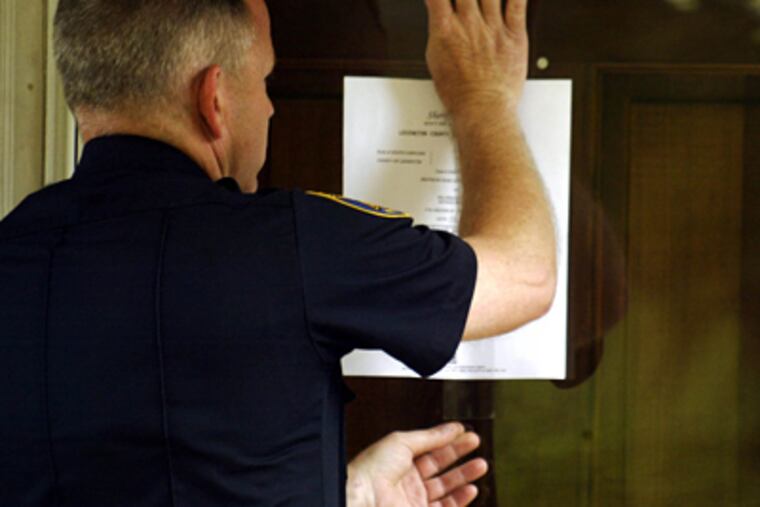Caught by mistake in foreclosure web
Christopher Marconi was in the shower when he heard a loud banging on his door outside New York City. By the time he grabbed a towel and hustled to his front step, a U.S. marshal's sedan was peeling out of his driveway. Nailed to Marconi's front door was a foreclosure summons from Wells Fargo Bank, naming him as a defendant. But the notice was for a house Marconi had never seen - on a mortgage he never had.

Christopher Marconi was in the shower when he heard a loud banging on his door outside New York City.
By the time he grabbed a towel and hustled to his front step, a U.S. marshal's sedan was peeling out of his driveway. Nailed to Marconi's front door was a foreclosure summons from Wells Fargo Bank, naming him as a defendant. But the notice was for a house Marconi had never seen - on a mortgage he never had.
Tom Williams was in his kitchen in Kansas thumbing through the mail when he opened a letter from GMAC. It informed him that the bank would confiscate his house unless he immediately paid off his mortgage balance of $276,000. But Williams had never missed a mortgage payment. And his loan wasn't due to mature until 2032.
Warren Nyerges opened his front door in Naples, Fla., to find a summons-server standing on his stoop. He plopped a foreclosure notice from Bank of America in Nyerges' hands. But Nyerges had paid for his house in cash. And he'd never had a checking account, much less a mortgage, with Bank of America.
News headlines recently have highlighted stories of bank robo-signers powering through hundreds of foreclosure affidavits a day without verifying a single fact. But most of those involved were homeowners who had stopped paying their mortgage. They were genuine defaulters.
Now a new species of homeowner is getting pushed into foreclosure hell.
People have always loved to complain about their banks, including their fees and their service. But the false foreclosure cases are hardly the usual complaints. These homeowners paid their mortgages - or loan modifications - on time. Some even paid off their loans.
Worse, those on the receiving end of a bad foreclosure claim tell similar stories of getting bounced from one bank official to the next with no resolution while the foreclosure process continues apace.
Many have to resort to paying a lawyer, even after presenting documentation. They say they have to sue not only to stop the wrongful foreclosure but also to attempt to win back their costs.
There are no official statistics on these homeowners, but lawyers, real estate agents, and consumer advocates say their ranks are growing.
Diane Thompson, a lawyer with the National Consumer Law Center, has defended hundreds of foreclosure cases. "In virtually every case, I believe the homeowner was not in default when you looked at the surrounding facts," she said. "It is a widespread problem throughout the country."
Homeowners in Pennsylvania, Florida, Nevada, and Texas have filed lawsuits alleging that they were victims of mistaken foreclosure.
One such suit was filed in March by Gibsonia, Pa., homeowner Angela Iannelli. She was up-to-date on her payments when, she says, she arrived home in October 2009 to find that Bank of America had ransacked her belongings, cut off her utilities, poured antifreeze down her drains, padlocked her doors, and confiscated Luke, her pet parrot of 10 years. It took her six weeks to get the bank to clean up the house, near Pittsburgh.
Iannelli's lawyer says the parties are in the process of "mutually resolving the issues" and the lawsuit is "in the process of being discontinued." Bank of America did not respond to a request for comment.
It's becoming clear just how chaotic the foreclosure system is. Depositions from employees working for the banks or their law firms depict a process in which it was standard practice for employees with virtually no training to masquerade as vice presidents, sometimes signing foreclosure documents on behalf of as many as 15 different banks.
The banks say that they are reviewing their mortgage and foreclosure procedures and that most of the people involved in foreclosure deals were behind on their payments. As for people wrongly caught in the foreclosure net, they say they are reviewing those cases, too.